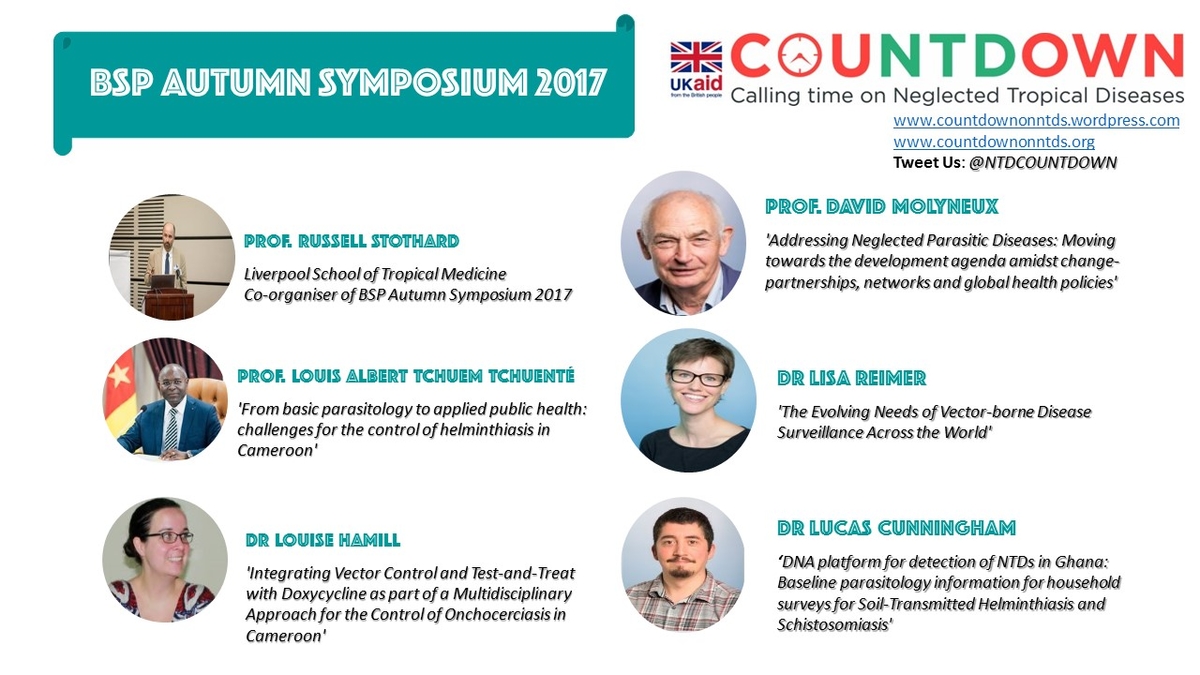
COUNTDOWN at the British Society for Parasitology Autumn Symposium, 28th September 2017, with Lucas Cunningham, Louise Hamill, Zikmund Bartoníček, Lisa Reimer, Louis-Albert Tchuem-Tchuenté, David Molyneux, Mark Taylor, Russ Stothard
The British Society for Parasitology Autumn Symposium is an annual event which this year took place on the 28th September 2017 in London at The Linnean Society, Burlington House. It was organised by Prof Russ Stothard and Dr Bonnie Webster, entitled “The Multidisciplinarity of Parasitology: Host-parasite evolution and control in an ever-changing world”.
The programme attempted to draw together and develop a multi-facet appraisal of the biology and control of parasites. The symposium has subsequently stimulated a meeting report and a blog on Bug Bitten on why it is all interconnected in parasitology. Moreover, it was a convenient opportunity to feature some of COUNTDOWN’s stepwise progress in reporting our implementation research as set within the meeting’s three themes. With just over 25 speakers and with an audience of just over one hundred, The Linnean’s auditorium was at maximum capacity; a clear evidence of the general interest in multi-disciplinarity.
Prof Stothard warmly welcomed everyone present with the simple message that ‘all living species are involved in parasitism, either as parasites or as hosts’. Indeed, this is a universal truth, for parasitism is not just a successful evolutionary strategy but is also part of a broader picture of symbiosis and part of the classification of how organisms, big or small, interact. As a metaphor, parasitism is tremendously powerful, and is regularly used in today’s language to describe significant socio-political events and processes as societies and sometimes nations negatively exploit others.
The modern agenda of parasitological research is therefore exciting, challenging and globally relevant as illustrated by Sir Roy Anderson. In the context of human disease, those parasites that typically play a detrimental role in global health are notorious, for example, malaria and the neglected tropical disease (NTD) collective are very well-known. To help guide the discussions and for convenience sake, the Autumn Symposium was split into three themes to help develop discussions in a stepwise manner.
The ‘ever changing world’ theme placed ongoing parasitological research within the new terminology of the Anthropocene and how mankind is altering global environments which may or may not favour parasitic diseases of medical, veterinary or wildlife importance. Both Prof David Molyneux and Prof Louis-Albert Tchuem-Tchuenté highlighted the challenge of NTD control against the background of planetary health, national control programmes and sustainable development goals. Both schistosomiasis and soil-transmitted helminthiasis are two of the most sensitive NTDs to human modifications of the environment and WASH infrastructures. For example, the building of water impoundment dams and expansion of freshwater irrigation schemes each has the potential to increase the parasite transmission, especially where urbanisation creates local water stress. Control of schistosomiasis is typically a long-haul endeavour and in recognition of his pioneering work on the epidemiology and control of schistosomiasis, David Rollinson was awarded a career medal by the International Federation for Tropical Medicine (IFTM) President, Santiago Mas-Coma.

The ‘Multidisciplinarity of Parasitology’ encouraged synergies between molecular, ecological and social science components that link parasites and hosts into a more holistic appraisal of parasitism. COUNTDOWN molecular diagnostic work was presented by Lucas Cunningham and Zikmund Bartoníček on soil-transmitted helminthiasis and schistosomiasis as speed posters alongside surveillance and control studies on onchocerciasis control in Cameroon by Louise Hammill together with community engagement activities meshed with locally appropriate vector control strategies.
The ‘host-parasite evolution and control’ recognised that parasites are not simple self-replicating automata and are very able to respond rapidly to interventions waged against them. Lisa Reimer discussed opportunities for xenomonitoring of mosquito populations for surveillance of lymphatic filariasis. The control of many parasitic diseases is a moving target as it is a dynamic and reactive system. It has been shown in previous control campaigns that a static strategy typically founder, therefore it is important to have in place an ability to monitor the success of any particular intervention and to ensure it is best tailored to the needs of the local populace for which it serves.
During the day, topics of discussion within the three themes often blurred, and they should, as cross-talk grew. Mark Taylor, President of the BSP closed the meeting and indicated that for a successful academic career in parasitology, a portfolio of skills and approaches is needed. To end symposium, it was very fitting to discuss many aspects of parasite evolution in The Linnean Society where Darwin and Wallace once read their papers, nearly 160 years ago. Over this time much has changed and we hope an important milestone from this meeting will be the production of a special issue of Parasitology which will leave a longer lasting footprint of how parasitism and human health are most intimately intertwined.
Find here a link to the Storify on our participation at the meeting.
Join us on social media for further interactions.
TWITTER: @NTDCOUNTDOWN @NTDGHCOUNTDOWN @COUNTDOWNNTDCAM
